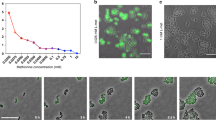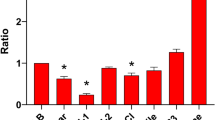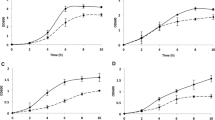Abstract
ISHIDSU1 has isolated a mutant (ars-1) of Salmonella typhimurium that grows normally on a minimal medium but is strongly inhibited on addition of arginine. This sensitivity to arginine can, be overcome by the addition of uracil.
This is a preview of subscription content, access via your institution
Access options
Subscribe to this journal
Receive 51 print issues and online access
$199.00 per year
only $3.90 per issue
Buy this article
- Purchase on Springer Link
- Instant access to full article PDF
Prices may be subject to local taxes which are calculated during checkout
Similar content being viewed by others
References
Ishidsu, J., Ann. Rep., No. 15, National Institute of Genetics, Mishima, Japan (1964).
Demerec, M., Proc. U.S. Nat. Acad. Sci., 51, 1057 (1964).
Yan, Y., and Demerec, M., Genetics, 52, 643 (1965).
Sanderson, K. E., and Demerec, M., Genetics, 51, 897 (1965).
Piérard, A., Glansdorf, N., Mergesy, N., and Wiame, J. M., J. Mol. Biol., 14, 23 (1965)
Piérard, A., and Wiame, J. M., Biochem. Biophys. Res. Commun., 15, 76 (1964).
Author information
Authors and Affiliations
Rights and permissions
About this article
Cite this article
EISENSTARK, A. Linkage of Arginine-sensitive (ars) and Uracil-Arginine Requiring (pyrA) Loci of Salmonella typhimurium. Nature 213, 1263–1264 (1967). https://doi.org/10.1038/2131263b0
Issue Date:
DOI: https://doi.org/10.1038/2131263b0
This article is cited by
-
Physiology and genetics of carbamoylphosphate synthesis in Escherichia coli K12
Molecular and General Genetics MGG (1974)
Comments
By submitting a comment you agree to abide by our Terms and Community Guidelines. If you find something abusive or that does not comply with our terms or guidelines please flag it as inappropriate.



